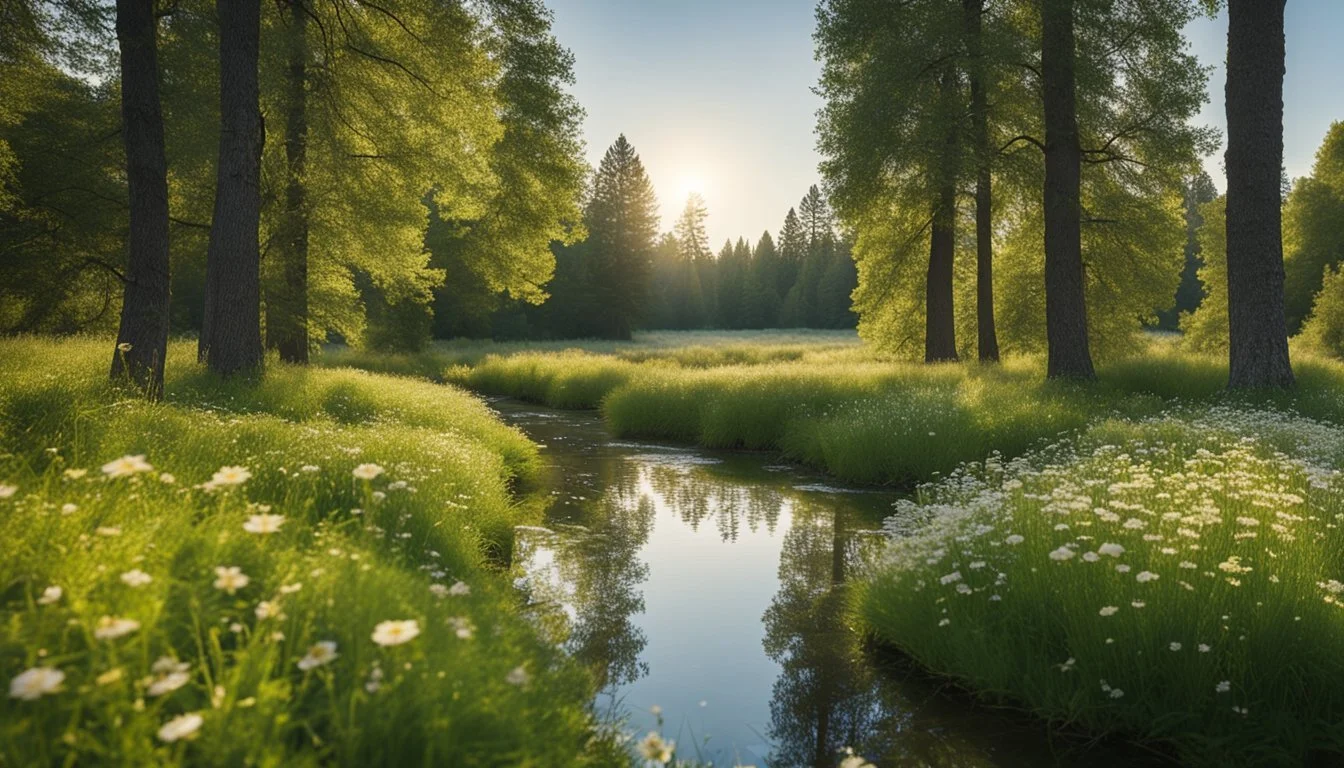7 Documentaries That Explore the Evolution of Love Over Time
A Journey Through Changing Relationships
Documentaries have long served as powerful tools for exploring the intricacies of human relationships. By capturing real-life stories and experiences, these films offer unique insights into the complex world of love and romance. From historical perspectives to modern-day challenges, documentaries provide viewers with a deeper understanding of how love evolves over time.
These seven documentaries showcase the changing nature of love across different eras, cultures, and societal norms. Through intimate interviews, personal narratives, and expert analysis, they reveal the universal aspects of human connection while highlighting the ways in which our understanding and expression of love have transformed throughout history. By examining these films, viewers can gain valuable perspectives on the ever-changing landscape of romance and relationships.
1) 'The Science of Love' by Robin Dunbar (2012)
'The Science of Love' is a documentary based on Robin Dunbar's book of the same name. Dunbar, a renowned evolutionary anthropologist, explores the biological and evolutionary aspects of romantic love.
The film delves into various facets of love, including passion, commitment, and intimacy. It examines these concepts from a scientific perspective, offering insights into why humans have evolved to experience love.
Dunbar's research covers topics such as hugging, kissing, monogamy, and cheating. The documentary presents these findings in an accessible manner, helping viewers understand the science behind romantic behaviors.
The film also addresses the evolutionary purpose of love and its role in human relationships. It explores how love has shaped human social structures and mating patterns over time.
By combining scientific research with relatable examples, 'The Science of Love' provides a comprehensive look at the biological underpinnings of romantic relationships.
More information on Robin Dunbar and his work
2) 'Love, Etc.' by Jill Andresevic (2010)
'Love, Etc.' offers a captivating look at love in New York City. Director Jill Andresevic follows five couples at different stages of their relationships over the course of a year.
The documentary explores various facets of love, from young romance to long-term commitment. It features high school sweethearts, a single gay man seeking partnership, and a couple approaching their 50th anniversary.
Andresevic's film captures the essence of love in the urban landscape. It showcases the diversity of relationships across New York's five boroughs, including Jamaica Hills, Forest Hills, Harlem, and SoHo.
The documentary blends elements of romantic comedy and reality television. It presents a witty and poignant exploration of universal stages of love, offering viewers relatable stories of hearts breaking and mending.
'Love, Etc.' stands out for its authentic portrayal of real people navigating the complexities of relationships. It provides an intimate look at the joys and challenges of love in a vibrant city.
More information on 'Love, Etc.' (IMDb)
3) 'The Love Industry: A Media History' by Harald E.L. Prins (2012)
'The Love Industry: A Media History' examines how media has shaped perceptions of love and relationships over time. Harald E.L. Prins, an anthropologist, explores the evolution of romantic ideals through various forms of media.
The documentary traces the impact of literature, film, television, and digital platforms on societal notions of love. It highlights how these mediums have influenced courtship rituals, marriage expectations, and expressions of affection.
Prins investigates the commercialization of love, from Valentine's Day marketing to dating apps. He analyzes how media representations have created unrealistic standards for relationships and affected real-world interactions.
The film features interviews with media scholars, psychologists, and cultural historians. It incorporates archival footage and contemporary examples to illustrate changing attitudes towards love across generations.
'The Love Industry' offers a thought-provoking look at the intersection of media, culture, and human emotions. It encourages viewers to critically examine the role of media in shaping their own beliefs about love and relationships.
More information on Harald E.L. Prins
4) 'The Nature of Love' by Irving Singer
'The Nature of Love' is a comprehensive exploration of love's evolution through history. Irving Singer, a philosopher, examines different conceptions of love across various time periods.
The work is divided into three volumes, with the second volume focusing on courtly and romantic love. Singer analyzes the shift from medieval courtly love to 19th-century Romantic ideals.
Singer argues that both God and humans are capable of authentic love. He delves into the traditions of courtly love from the 12th century onward, highlighting its impact on human relationships.
The documentary draws from Singer's extensive research, offering viewers a deep dive into the philosophical and cultural aspects of love. It presents a scholarly yet accessible look at how societal views on love have changed over time.
By examining historical perspectives, the film provides insights into modern concepts of love and relationships. It challenges viewers to consider how past ideas continue to influence contemporary attitudes.
More information on Irving Singer's work
5) 'Love's Labour's Lost' by Thomas Docherty (2000)
Thomas Docherty's adaptation of Shakespeare's play brings the classic comedy into the 20th century. The film transposes the story to the 1930s, setting it against a backdrop of song and dance.
The plot follows the King of Navarre and his friends as they swear off women to focus on their studies. Their plans are quickly derailed by the arrival of the Princess of France and her ladies.
Docherty's version incorporates musical numbers from the era, adding a lively twist to the Shakespearean dialogue. The film stars Kenneth Branagh, Alicia Silverstone, and Nathan Lane.
While not a traditional documentary, this adaptation offers insight into how love stories can be reimagined across different time periods. It showcases the enduring themes of romance and courtship in Shakespeare's work.
The film explores the evolution of love through its modern setting, blending classic text with contemporary elements. It demonstrates how age-old romantic conflicts remain relevant in new contexts.
More information on 'Love's Labour's Lost' (2000)
6) 'Love in the 21st Century' series by Channel 4 (1999)
'Love in the 21st Century' is a British television series that aired on Channel 4 in 1999. The show explores various aspects of modern relationships and sexuality through six individual episodes.
Each episode focuses on a different theme related to love and intimacy in contemporary society. The series tackles subjects like infidelity, age-gap relationships, and changing sexual dynamics.
One notable episode titled "Toyboys" examines the relationship between a married teacher and her 15-year-old student. This provocative storyline exemplifies the show's willingness to address controversial topics.
The series features performances from actors such as Catherine McCormack, Ioan Gruffudd, and Clare Holman. It aims to portray the complexities of love and sex as society moves into a new century.
'Love in the 21st Century' sparked debate in the UK due to its frank depiction of sexual themes. The show reflects British television's reputation for more open discussions of intimate subjects.
7) 'The Triumph of Love' by Alain de Botton (2016)
'The Triumph of Love' is a thought-provoking documentary by philosopher Alain de Botton. It explores the complexities of modern relationships and the evolution of romantic love.
De Botton challenges conventional notions of love, arguing that long-term relationships require more than just passion. He emphasizes the importance of communication, compromise, and shared growth.
The film examines how societal expectations and media portrayals of love can create unrealistic ideals. It encourages viewers to embrace a more realistic and sustainable approach to relationships.
De Botton draws on his extensive knowledge of philosophy and psychology to offer insights into the nature of love. He presents practical advice for nurturing lasting connections in the face of everyday challenges.
'The Triumph of Love' stands out for its honest and nuanced exploration of romantic relationships in the contemporary world. It offers a refreshing perspective on love's evolution and enduring importance in human life.
More information on Alain de Botton
The Historical Evolution of Love
Love has transformed dramatically throughout human history, shaped by cultural, social, and economic forces. Its meaning and expression have varied across different eras and civilizations.
Ancient and Medieval Concepts
In ancient Greece, love took multiple forms. Eros represented passionate desire, while philia signified deep friendship. Agape embodied selfless, unconditional love. Ancient Roman poetry often celebrated romantic love, as seen in Ovid's works.
Medieval courtly love emerged in 12th-century Europe. This idealized form of romantic attachment between nobles emphasized chivalry and emotional intimacy. It influenced literature and social norms, giving rise to stories like Tristan and Iseult.
In many non-Western cultures, love was often tied to duty and family obligations. Arranged marriages were common, with personal affection expected to develop over time.
Love in the Modern Era
The Renaissance and Enlightenment periods brought new perspectives on love. Individual choice in marriage became more accepted, and romantic love gained importance as a basis for partnerships.
The Industrial Revolution and urbanization changed dating practices. Young people had more freedom to meet potential partners outside family circles. The rise of the middle class led to new courtship rituals.
In the 20th century, love became increasingly diverse and visible. The feminist movement challenged traditional gender roles in relationships. Same-sex love gained more recognition and acceptance in many societies.
Today, technology plays a significant role in how people find and express love. Online dating and social media have expanded the possibilities for connection across geographical and social boundaries.
Cultural Variations in Love
Love is expressed and experienced differently across cultures, influenced by societal norms, traditions, and historical contexts. These variations shape how relationships form and evolve in different parts of the world.
Western Interpretations
In Western cultures, romantic love often takes center stage. The concept of courtly love emerged in medieval Europe, idealizing chivalrous devotion. This evolved into the modern notion of passionate, individualistic love.
Western literature reflects this focus. Novels like "Forty Rules of Love" by Elif Shafak blend Eastern and Western perspectives, exploring the transformative power of love across cultural boundaries. Such works highlight the Western fascination with love as a profound, life-changing force.
Hollywood reinforces ideals of romantic love through countless films and TV shows. These portrayals typically emphasize personal choice, emotional connection, and the pursuit of individual happiness in relationships.
Eastern Perspectives
Eastern cultures often view love through a broader lens that includes family, community, and spiritual dimensions. In many Asian societies, love is intertwined with concepts of duty and collective harmony.
Traditional Eastern literature frequently depicts love as part of a larger cosmic order. Ancient poems and stories often portray love as a path to spiritual enlightenment or as a reflection of divine love.
In some Eastern cultures, arranged marriages remain common. These unions prioritize familial and social compatibility over romantic passion. Love is expected to grow over time through shared experiences and mutual respect.
Eastern philosophies like Buddhism and Hinduism influence perceptions of love, emphasizing compassion and selflessness in relationships. This contrasts with the more individualistic Western view of romantic love.






